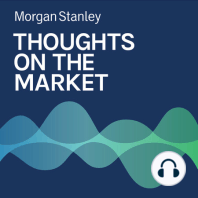4 min listen

Chetan Ahya: Global Impacts on Asia's Growth
Chetan Ahya: Global Impacts on Asia's Growth
ratings:
Length:
4 minutes
Released:
Apr 12, 2023
Format:
Podcast episode
Description
Given the recent developments in developed markets banking sectors, can Asia’s economic growth continue to outperform?----- Transcript -----Welcome to Thoughts on the Market. I'm Chetan Ahya, Morgan Stanley's Chief Asia Economist. Along with my colleagues bringing you a variety of perspectives, today I'll be discussing why Asia remains better placed despite recent global financial developments. It's Wednesday, April 12, at 9 a.m in Hong Kong. With the recent issues in the Developed Markets banking sector, investors are asking if Asia could face similar funding challenges and if Asia will still be able to outperform on growth. On the funding challenge, a key point to keep in mind is that interest rates have not risen as much in Asia compared to the U.S.. Asia's inflation was more cost-push driven, i.e commodity prices driven, and has already started to decelerate, and so central banks did not have to hike rates as much as the Fed. For instance, on July 21, policy rates rose by 4.75% in the U.S., but in Asia, it has risen only by one percentage point on an average. In a similar vein, prior to recent developments, 10 year bond yields rose by 2.8 percentage points in the U.S., but have only risen by just 0.9% in Asia. Another important distinguishing factor has to do with the setup of the banking sector. In Asia, liquidity coverage ratios are well above 100%, loans tend to be more floating rather than fixed, and deposit franchises are more diversified. Turning to the second question on whether Asia can still outperform. We think that recent developments will pose downside risks to both developed markets and Asia's growth but on net, Asia will still be able to outperform. In the case of a meaningful slowdown or a mild technical recession in the U.S., there will be three mitigating factors for Asia's growth outlook. First, the impact from weaker trade would be partially offset by easier financial conditions from lower market pricing of Fed's path, as well as lower commodity prices, leading to an improvement in Asia's terms of trade. The more stable macroeconomic backdrop in Asia means central banks in the region do have more room to ease monetary policy. In our base case, we expect rate cuts starting from the first quarter of 2024, but if downside risks emerge, these rate cuts could come into play sooner than we anticipate. Second, we expect China's GDP to recover to 5.7% in 2023. Reopening is lifting economic activity in China and also helping to generate positive spillovers for the rest of the region. Third, the three of the other large economies in Asia, Japan, India and Indonesia all have economy specific factors driving domestic demand. Japan's accommodative macro policies should keep private sector demand supported. For India, balance sheets for the financial and non-financial private sector have been cleaned up over the years. The private sector is thus pricing with a healthy risk appetite for expansion. In Indonesia, macro stability risks have been well managed, hence, rates have not had to rise as much in other emerging markets, and domestic demand has therefore remained robust. However, we do think that the risks are skewed to the downside. In a hard landing scenario, which we would characterize as U.S. full year GDP contracting by 1% or more, Asia may not be able to escape the downdraft and could recouple on the downside, at least during the worst point of the shock. But once we see a stabilization of global financial conditions with policy response, we believe Asia will be able to recover faster than the U.S. and Europe and resume its growth outperformance. Thanks for listening. If you enjoy the show, please leave us a review on Apple Podcasts and share Thoughts on the Market with a friend or a colleague today.
Released:
Apr 12, 2023
Format:
Podcast episode
Titles in the series (100)
Mike Wilson: Weighing a Potential Fed Rate Cut by Thoughts on the Market